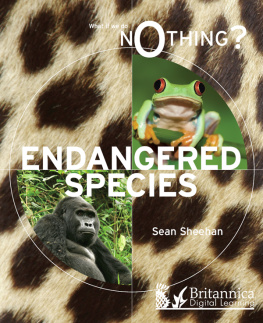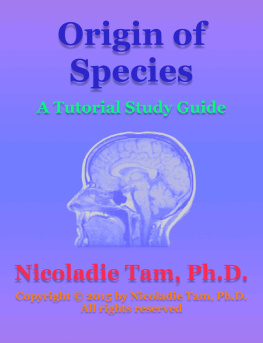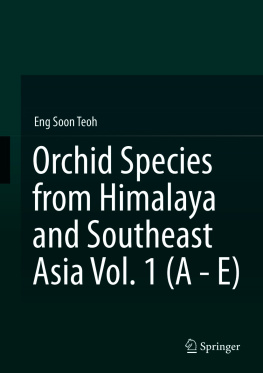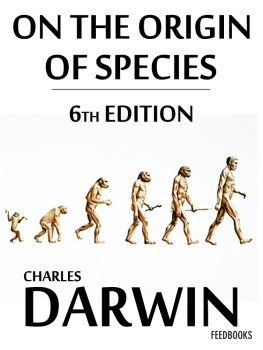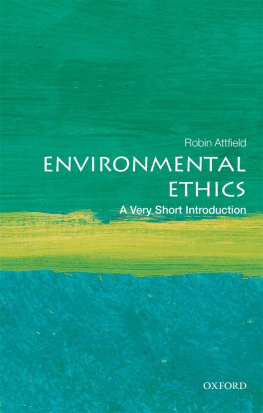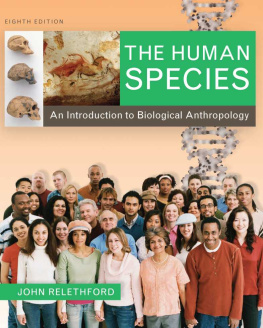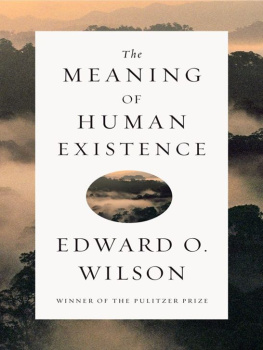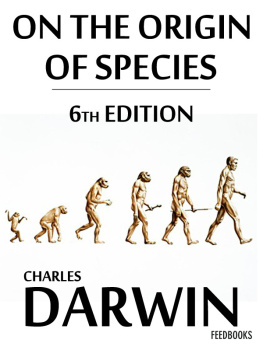The Value of Species
The Value of Species
Edward L. McCord

Published with assistance from the foundation established in memory of Amasa Stone Mather of the Class of 1907, Yale College.
Copyright 2012 by Edward L. McCord. All rights reserved. This book may not be reproduced, in whole or in part, including illustrations, in any form (beyond that copying permitted by Sections 107 and 108 of the U.S. Copyright Law and except by reviewers for the public press), without written permission from the publishers.
Yale University Press books may be purchased in quantity for educational, business, or promotional use. For information, please e-mail sales.press@yale.edu (U.S. office) or sales@yaleup.co.uk (U.K. office).
Set in Minion type by Keystone Typesetting, Inc.
Printed in the United States of America.
Library of Congress Cataloging-in-Publication Data McCord, Edward LeRoy.
The value of species / Edward L. McCord.
p. cm.
Includes bibliographical references (p. ) and index.
ISBN 978-0-300-17657-5 (alk. paper)
1. Environmental ethics. 2. Species. 3. Biodiversity. 4. Extinction (Biology) 5. NatureEffect of human beings on. 6. Environmental policy. I. Title.
GE42.M378 2012
179.1dc23 2011035192
A catalogue record for this book is available from the British Library.
This paper meets the requirements of ANSI/NISO Z39.481992 (Permanence of Paper).
10 9 8 7 6 5 4 3 2 1
To my mother and father, Betty and Guyte, and to my grandmother Elizabeth Reed Mack
The World Is Too Much with Us
The world is too much with us; late and soon,
Getting and spending, we lay waste our powers:
Little we see in Nature that is ours;
We have given our hearts away, a sordid boon!
The Sea that bares her bosom to the moon;
The winds that will be howling at all hours,
And are up-gathered now like sleeping flowers;
For this, for everything, we are out of tune;
It moves us not.Great God! Id rather be
A Pagan suckled in a creed outworn;
So might I, standing on this pleasant lea,
Have glimpses that would make me less forlorn;
Have sight of Proteus rising from the sea;
Or hear old Triton blow his wreathed horn.
William Wordsworth (1806)
CONTENTS
PREFACE
Did you notice when the natural world first grabbed your attention? When you realized with all your sensibility that we are not alonethat our world teems with birds, bugs, reptiles, and other creatures that are certainly not human but are certainly also not unrelated to us? It is a stunning revelation and a memorable moment in a human life. It begins a journey that leads to frontiers of self-discovery and endless interplay between the life within us and the living world without.
We come from diverse homelands and childhoods that afford us varying engagements with the natural world. For my part, I grew up in north Florida, and I lost myself with friends in outdoor adventures as a boy. Ours was a land of salt marshes and fiddler crabs, of black lagoons and dark ravines, of watery sinkholes with walls of limestone and ferns, of crystalline rivers winding through glades of cypress and Spanish moss, of the sounds of cicadas, owls, frogs, and whippoorwills, and gentle winds blowing through the pines, crashing claps of thunder, drenching warm rains.
Nature and the outdoors were a passion for my parents, who generously indulged the same in my brother, my sister, and me. With my brothers deft interceptions, we took in opossums, crows, flying squirrels, snakes, salamanders, raptors, turtles, and even a young green heron. I was captivated by everything great and small that crawled or flew or unfolded in growth. But my first revelation of the astonishing and improbable mysteries of nature among which we live occurred when I was eleven, when I opened a National Geographic feature on the carnivorous plants native to my area. The world was never the same for me after that. I knew then that we move among miracles.
North Florida is known for its wealth of carnivorous plants. In sandy coastal wetlands their sculptural leaves of red, yellow, and green glow in the sunlight across shimmering grassy landscapes of longleaf pine, sweet bay magnolia, and bald cypress. Exquisite terrestrial orchids grow in these same pine barrens, and they became another great passion of mine. Calapogon tuberosus, Platanthera ciliaris, Cleistes divaricata: I pursued orchids in summer excursions from deep in the Everglades to the forests of the Appalachian Mountains and the quaking sphagnum bogs of northern Wisconsin, where I worked in a camp for the National Audubon Society.
When I was fourteen I read a passage in a horticultural encyclopedia that ignited my imagination as nothing had before. It described a towering mountain on the island of Borneo, a mist-shrouded pinnacle that harbored fantastic species of carnivorous plants found nowhere in the world but on its steaming slopes along with a thousand species of orchids. After years of dreaming about the trek, in the summer after my first year of law school I hiked up Mount Kinabalu, reaching the summit at dawn. I was so engrossed and excited that I lost all track of time.
Children everywhere awaken at an early age to countless lifelong interestsairplanes, horses, computers, baseball. Who knows how or why this happens? They awaken as well to awareness of other life, each in his or her own way. Every child at some time surrenders, even if fleetingly, to the fascination of a living thinga sparrow, a tadpole, an ant, a porcupine, a mushroom. Humans surely have roused to the wonders of existence since time immemorial. But there is a new wind blowing among youth today. They are attracted in great numbers to courses in environmental studies that were completely unknown a few decades ago.
I have been teaching these courses for a dozen years now. It is something I had never planned to do when I was in graduate school studying the philosophy of science and theories of meaning, or during my years as a lawyer. But I found the opportunity that was offered to me by my university irresistible, for I have come to believe that environmental studies deal with the most profound and urgent frontier that humanity has ever faced.
I wrote this book on a guest ranch in Wyoming, where I am the director of a multidisciplinary Yellowstone Field Course for the Honors College at the University of Pittsburgh. Our classroom at the site of the worlds largest volcanic caldera is only the grand sky above us and the ancient processes of geology and ecology surrounding us. I also oversee a 6,000-acre preserve for ecology, archaeology, and paleontology in the opposite corner of Wyoming. A generous cattle rancher donated this land to our university as an educational and scientific preserve. In 2007 our undergraduates, in their first project there, unearthed from a grassy hillside the shoulder blade of an Apatosaurus. To hold in ones hands the remnant of such a spectacular creature that roamed the earth millions of years ago is an extraordinary experience. But more wondrous still is to realize that we too are forms of life that evolved on the same planet as that dinosaur, and that we are standing in this moment of time and perceiving with a special intelligence the dinosaurs fossil remnant. Ours is a comprehension and sense of wonder unmatched, to the best of our knowledge, by any other species in the universe.
These reflections about human self-awareness and the associated values of discovery humans share, disconcerting in the practical world of affairs and largely neglected in the classroom, are the subject of this book. Environmental studies are not the discrete and separate topics that appear in course catalogues but an integrated web of interactive themes across the sciences and humanities. How could this be otherwise? These studies are surely ultimately and most relevantly about defining our human identity on earth. And each of us is a person, not an amalgam of dissociated parts. Environmental studies must be routes to understanding, reconciling, and advancing our human values. In other words, to fail to see how a structure of values integrates the disparate disciplines of environmental studies is a failure to function as a healthy, effective, and whole person.
Next page

